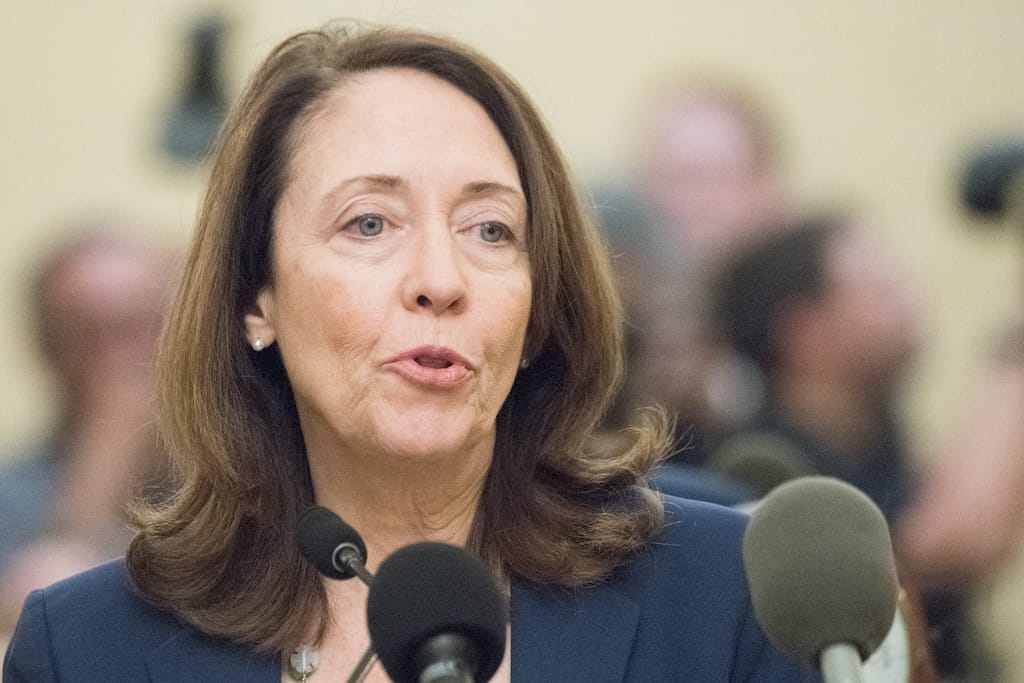Cantwell Ups ACP Money in Updated Draft Spectrum Auction Bill
The proposal would provide $7 billion for the ACP, an increase from the discussion draft.
Jake Neenan

WASHINGTON, April 29, 2024 – Senate Commerce Committee Chair Maria Cantwell, D-Washington, filed on Friday an amendment to her draft spectrum auction legislation that would provide more funding for the Affordable Connectivity Program.
The amended draft would provide $7 billion to keep the ACP afloat, up from $5 billion in the previous version, with proceeds from spectrum auctions earmarked to pay back those loans and for other spending priorities like the rip and replace program. The Senate Commerce Committee is planning to vote on the bill and other broadband legislation on May 1.
The yet-to-be-filed bill would reinstate for five years the Federal Communications Commission’s authority to auction off spectrum bands to commercial users. The FCC’s authority lapsed for the first time in March 2023, and efforts at putting it back in place have stalled – to the extent that the agency has sought comment on ways to get spectrum out the door without auction authority.
Called the Spectrum and National Security Act, the proposal would direct the FCC to auction spectrum in the upper 12 gigahertz band within 3 years and require the National Telecommunications and Information Administration, the agency responsible for federal spectrum management, to conduct feasibility studies on the 7, 8, and 37 GHz bands. It would also stand up a $200 million program for nonprofits to assist minority-serving institutions with broadband grant applications, plus funding for spectrum sharing testbeds, telecom workforce development, research and development programs, and 911 system upgrades.
While focused on beefing up the nation’s spectrum pipeline, Cantwell’s proposal is also a last-gasp effort at securing funding for the ACP, which provides a $30 and $75 monthly internet discount for 23 million low-income households and is set to dry up in May. April is the last month in which providers can receive the full subsidy for their ACP-participant customers, and the FCC will expend the last of the fund’s cash on a reduced $14 benefit in May.
Rep. Yvette Clarke, D-New York, has filed a discharge petition to move her ACP Extension Act, which would also provide $7 billion, out of committee and force a floor vote without House Speaker Mike Johnson’s blessing. The petition would need the signatures of a majority of the House in order to force a vote, meaning at least five Republicans would have to sign on if all 213 Democrats get on board. Clarke’s bill has 228 cosponsors, including 22 Republicans, but it’s not clear how many would take the additional step against leadership and add their names.
Five Senate Democrats asked internet providers on Friday to make up the difference and foot the $16 that ACP subscribers could see tacked onto their bills for May.
“With both the Senate and House of Representatives in sessions for four weeks in May, this extra time would give lawmakers a critical window to work on and pass a legislative solution,” they wrote.
Charter’s top executive said on an earnings call the same day that the company – the program's largest participant – is planning to provide $1 on top of the partial benefit for its 5 million ACP subscribers.
“We'll go through the month of May with a partial ACP in accordance with what the government outlined. It's going to be a partial credit of $14, and we've agreed to make it $15 just to round it and make it clear …and fair to customers,” Charter CEO Christopher Winfrey said.
Also up for consideration at the May 1 markup are the Rural Broadband Protection Act and the Network Equipment Transparency Act.
The former would more thoroughly vet participants and impose harsher penalties for future defaults in some of the FCC’s Universal Service Fund programs.
The agency’s Rural Digital Opportunity Fund, which supports new broadband infrastructure through the USF, in particular has been plagued by defaults. Advocates are pushing the FCC to hand down smaller penalties to encourage defaults and open up RDOF areas that might not see full deployments to the $42.5-billion BEAD program.
The Network Equipment Transparency Act would require the FCC’s biannual marketplace report to describe the impacts of supply chain issues on broadband deployments.
Correction: An earlier version of this story said Charter was providing an additional $15 benefit for ACP subscribers. The company is providing an additional $1, for a total discount of $15 when compbined with the reduced $14 ACP benefit. The story has been corrected.









Member discussion